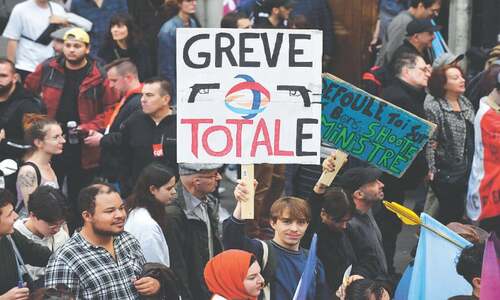PARIS: France on Saturday banned protests opposite parliament after a second night of unrest sparked by President Emmanuel Macron’s move to impose an unpopular pension overhaul without a parliament vote.
Macron’s government has invoked a controversial executive power to force through the bill by decree, causing an outrage among the political class as well as angry protests in streets.
Opposition lawmakers have filed two motions of no confidence in the government to be debated in parliament on Monday afternoon, according to parliamentary sources, in the hope to garner enough support to topple the cabinet and repeal the law seeking to raise the retirement age from 62 to 64.
After clashes between demonstrators and police the previous two nights, Paris police on Saturday banned protests at the capital’s Place de la Concorde across the Seine River from parliament.
Dozens arrested as protests in other parts of France continue
It said it was doing so “due to serious risks of disturbances to public order”.
Thousands of people rallied in the capital’s Place de la Concorde on Friday to vent their frustration at the government imposing the reform, despite two months of strikes and demonstrations against the change. Police moved in to disperse the crowd at nightfall, after a fire was lit in Place de la Concorde, journalists said.
Groups of people threw bottles and fireworks at the security forces, who responded by firing tear gas to try to clear the square. Police said they made 61 arrests. In the southeastern city of Lyon, demonstrators tried to break into a town hall and set fire to the building, said police, who reported 36 arrests.
After the ban, people marched in many other parts of the country as unions called for a weekend of protests. CGT union boss Philippe Martinez marched among hundreds of people in the town of Meaux outside Paris. Others rallied in the northern port city of Le Havre. “Macron, already deaf at 45 years old?” read one sign on the back of a protester’s jacket.
Unions have called for another day of nationwide strikes and rallies on Thursday.
Opinion polls have shown around two-thirds of French people oppose the reform, which is also to require people to work longer for a full pension.
The government has said it is necessary to avoid the system from slipping into deficit, and bring France into line with its European neighbours where the legal retirement age is typically later in life. But critics say the changes are unfair for people who start working at a young age in physically tough jobs, and women who interrupt their careers to raise children.
Trash strike
Protests since mid-January have garnered some of the largest crowds in decades, but the popular movement seemed to be starting to wane in the days before the government imposed the bill.
The capital’s municipal rubbish collectors have however kept up a rolling strike, leaving an estimated 10,000 tonnes of trash festering in the streets by Friday.
A union representative however on Saturday said that strikers at three incinerators outside Paris would let some garbage trucks through “to limit the risk of an epidemic”.
In the energy sector, the CGT union has said strikers would halt production at two refineries by this weekend or Monday at the latest.
Unions from national train operator SNCF on Friday urged workers to continue another continuous strike that has caused major disruption on the network.
Macron put the pension reform at the centre of his re-election campaign last year. But the former banker lost his parliamentary majority in June after elections for the National Assembly.
The government used the controversial Article 49.3 of the constitution on Thursday, as it feared not having enough backing in the lower house to win a vote on the pension bill. But Prime Minister Elisabeth Borne’s cabinet is largely expected to survive any no-confidence vote.
The motion would need backing from around half the group of opposition right-wing Republicans, a scenario seen as highly improbable.
Published in Dawn, March 19th, 2023
















































Dear visitor, the comments section is undergoing an overhaul and will return soon.